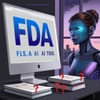The FDA's artificial intelligence tool, Elsa, designed to revolutionize drug approvals, has been making headlines for all the wrong reasons. Elsa, launched ahead of schedule and under budget, has been criticized for generating nonexistent studies, raising concerns about its reliability.
Elsa is a generative AI application that assists the FDA's scientific assessments by summarizing adverse events, analyzing clinical protocols, and comparing labels and documentation. However, the tool's tendency to "hallucinate" or make up information has sparked debate about its readiness for use.
Despite its potential to streamline reviews and decrease bottlenecks, Elsa's limitations have raised concerns about its impact on the drug approval process. The lack of transparency surrounding its development and testing phases has also been criticized.
The FDA maintains that Elsa is designed to augment, not replace, human expertise. Commissioner Dr. Marty Makary emphasizes that the agency's scientists are not required to use Elsa and that those who do must verify its work. The FDA plans to update Elsa to improve its performance and address concerns.
As the use of AI in regulatory processes becomes more prevalent, the FDA's experience with Elsa serves as a cautionary tale about the importance of ensuring the accuracy and reliability of these tools.


